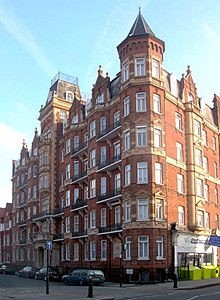Earl's Court Square




Earl's Court Square is a garden square in Earl's Court, London, England. It was developed from 1872 or 1873 on agricultural land belonging to the Edwardes family. It is primarily made up of stuccoed terraced houses with Italianate dressings but also contains properties in the Jacobean and Second Empire styles as well as a number of purpose built apartment blocks.
Notable former inhabitants include the choreographer Sir Frederick Ashton, Syd Barrett of Pink Floyd, and the ordnance inventor Sir William Palliser. At the Poetry Bookshop in the Square, conventional and modernist factions engaged in the "Battle of Earl's Court" in the 1970s.
Location
[edit]The Square lies between Warwick Road in the west and Earl's Court Road in the east, with the northern and southern sides extending to those roads beyond the square itself. Farnell Mews runs from the east side of the garden square.[1]
History and architecture
[edit]The Square was developed from 1872[2] or 1873[3] on agricultural land originally belonging to the Rich family and then to the Edwardes family[4] with the south side being developed last.[2] The terrace numbered 30 to 52 (even) on the south side was built in the Jacobean Revival style in 1888–1890.[2][3]
The general style of architecture is stuccoed terraced houses with Italianate dressings and upper floor balconies supported by columns, but there are several styles in the square including buildings that have Jacobean and Second Empire influences.[2] There are several purpose built apartment blocks, including Wetherby Mansions, Herbert Court Mansions, Langham Mansions, and more recently, Northgate House, built in 1965.[3]
By the 1970s, the Square was "extremely run down", and "there were two squalid brothels, they were at no. 9 and in the A-L block of Wetherby Mansions that were eventually evicted by the borough's Health Inspector and a sordid murder occurred at no. 4."[4]
The Poetry Society Bookshop was located at number 21 and in the 1970s was the scene of the "Battle of Earl's Court" when traditionalist and modernist poets fought for the future of British poetry during the British Poetry Revival after the modernists took over the conservative Poetry Society.[5][6][7]
There are no listed buildings in the Square but it was given conservation area status in 1975.[3]
Notable residents
[edit]- Sir Frederick Ashton, choreographer[8]
- Syd Barrett of Pink Floyd, musician, lived at 29 Wetherby Mansions from January 1969 with the artist Duggie Fields.[9]
- Joan Buck, American writer and actress[10]
- Sir John Egan, businessman, in 1960[11]
- Frank Gielgud, father of the actor Sir John Gielgud[8]
- Sir William Palliser, ordnance inventor, lived at no 21 (originally Earl's Court Lodge), and it was later home to the Poetry Society[3]
- Ninette de Valois, founder of The Sadler's Wells, later The Royal Ballet, lived at no 23 at the start of her career, as it was her parents' home.[3][8]
References
[edit]- ^ Earl's Court Square. OpenStreetMap. Retrieved 12 October 2019.
- ^ a b c d Pevsner, Nikolaus & Bridget Cherry. (2002). The Buildings of England: London 3: North West. New Haven & London: Yale University Press. p. 546. ISBN 0300096526.
- ^ a b c d e f "The Edwardes estate: South of West Cromwell Road". Survey of London. Retrieved 7 October 2019.
- ^ a b "The History of Earl's Court Square". ECSRA. Retrieved 7 October 2019.
- ^ Brinton, Ian. (2009). Contemporary Poetry: Poets and Poetry since 1990. Cambridge: Cambridge University Press. p. 24. ISBN 9780521712484.
- ^ Poets Behaving Badly. Robert Sheppard, Jacket2, October 2006. Retrieved 12 October 2019.
- ^ Poetry Wars, Salt Publishing. Retrieved 12 October 2019.
- ^ a b c "London Open Garden Squares Weekend: top 20 to visit". The Daily Telegraph. 14 June 2015. Retrieved 7 October 2019.
- ^ Barry Miles (12 December 2011). Pink Floyd: The Early Years. Omnibus Press. p. 270. ISBN 978-0-85712-740-2.
- ^ Allegra Huston (7 April 2009). Love Child: A Memoir of Family Lost and Found. Simon and Schuster. p. 239. ISBN 978-1-4391-5926-2.
- ^ John Egan; Des Wilson (24 February 2002). Private Business-Public Battleground: The Case for 21st Century Stakeholder Companies. Springer. p. 25. ISBN 978-0-230-55460-3.
External links
[edit] Media related to Earl's Court Square at Wikimedia Commons
Media related to Earl's Court Square at Wikimedia Commons
